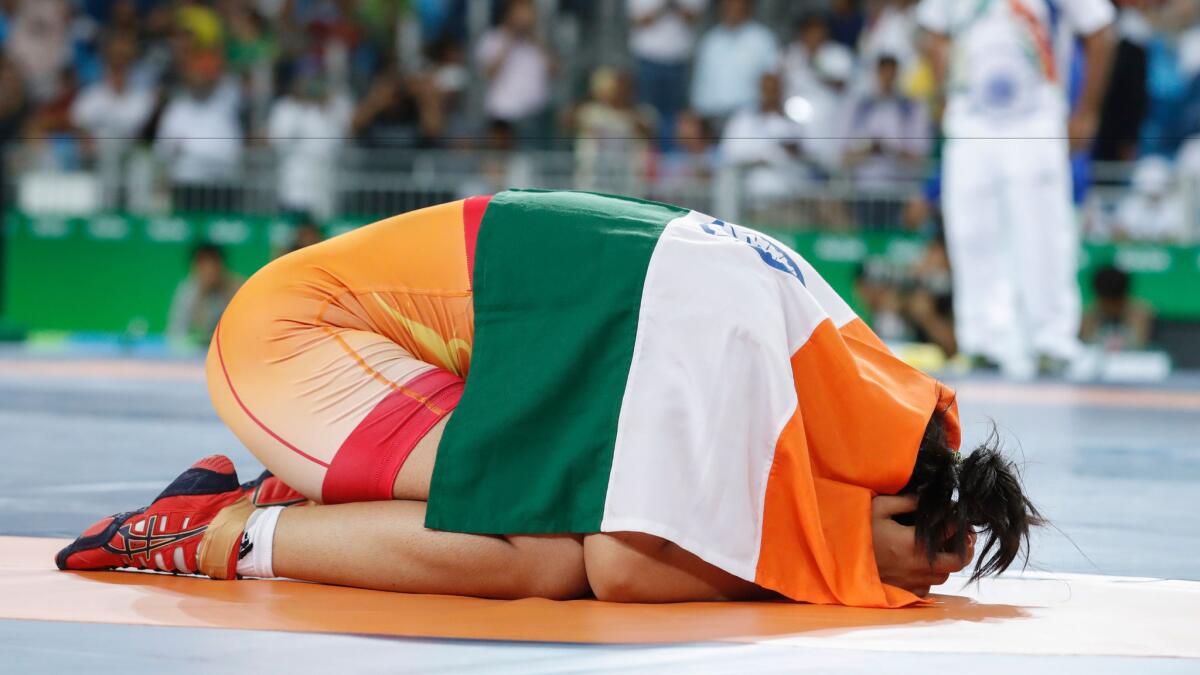It took 11 days and more than 100 athletes, but India finally won a medal at Rio Olympics

By winning a bronze medal in wrestling, 23-year-old Sakshi Malik helped India avoid a potentially embarrassing Olympic blackout.
The nation of 1.25 billion people awoke Thursday to the news that Malik had earned a place on the podium in the 58-kilogram category, the first medal for India at the Games in Rio de Janeiro.
“The entire nation is rejoicing,” Prime Minister Narendra Modi tweeted.
Malik’s come-from-behind win in a playoff bout against a wrestler from Kyrgyzstan pulled India into a tie at the bottom of the medals table with countries such as the Dominican Republic, Estonia and Moldova. But it prompted a flurry of joyous messages on social media.
Thursday evening, badminton player P.V. Sindhu advanced to the women’s singles final, assuring her either a gold or silver — India’s second medal.
Until now, it had been another disastrous Olympics campaign for India. The world’s second most populous country has collected barely two dozen medals at more than 30 Olympic Games.
Rio organizers threatened to bar India’s sports minister, Vijay Goel, from the Games for “aggressive and rude” behavior by members of his entourage, who apparently tried to barge into venues without accreditation.
Goel later caused further embarrassment when he tweeted out messages of support to Indian athletes but used incorrect names and photographs.
Then, according to media reports, the Indian Embassy in Rio hosted an evening reception to mark the country’s independence day and told its athletes to come. Only the embassy didn’t serve food – only coffee, tea and peanuts.
Despite a passion for sports such as tennis and badminton – and a long tradition of wrestling – Indian athletes complain of mismanagement by the country’s athletics federations and a lack of investment in training and facilities. Cricket, a national pastime, is not an Olympic sport.
In 2014, the International Olympic Committee barred India from the Winter Games in Sochi, Russia, over corruption allegations. Three Indian athletes who qualified for the competition had to compete as independents.
Read more Olympics coverage by the Los Angeles Times »
This year, India fielded its largest ever Olympic team: more than 100 athletes. But its top medal hopes – including defending rifle shooting gold medalist Abhinav Bindra and the mixed-doubles tennis team of Sania Mirza and Rohan Bopanna – all fell one position shy of the medal podium.
Indian women have been the brightest spots. Dipa Karmakar, 22, placed fourth in the vault, the best ever showing for an Indian gymnast. Sprinter Dutee Chand, who was once ruled ineligible for international competitions because she had high levels of testosterone, won a court battle to be reinstated in time to run in Rio.
Like many Indian Olympians, Chand comes from a humble background, the daughter of weavers in the eastern state of Orissa who earn barely $50 per month.
Although Indian sporting officials have tried various initiatives to identify and support young potential Olympians, athletes and experts say more investment is needed at the grass-roots level. Kamarkar, for example, had no training facility in her native northeastern state of Tripura and had to train hundreds of miles away, in New Delhi.
“You can’t spot talent early without making inroads into villages and districts,” said Ayaz Memon, a senior sports journalist. “All your athletes are coming out from the smaller towns.”
Bindra, who won a gold medal at the 2012 London Games, tweeted that Britain’s investment in sports averaged out to more than $7 million per Olympic medal.
“That’s the sort of investment needed,” he said. “Let’s not expect much until we put systems in place at home.”
Parth M.N. is a special correspondent.
Follow @SBengali on Twitter for more news from South Asia
UPDATES:
11:45 a.m.: This article was updated to reflect that India would win its second medal.
This article was originally published at 10:35 a.m.
Sign up for Essential California
The most important California stories and recommendations in your inbox every morning.
You may occasionally receive promotional content from the Los Angeles Times.








